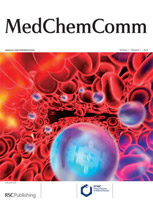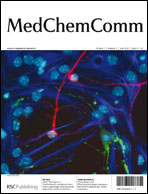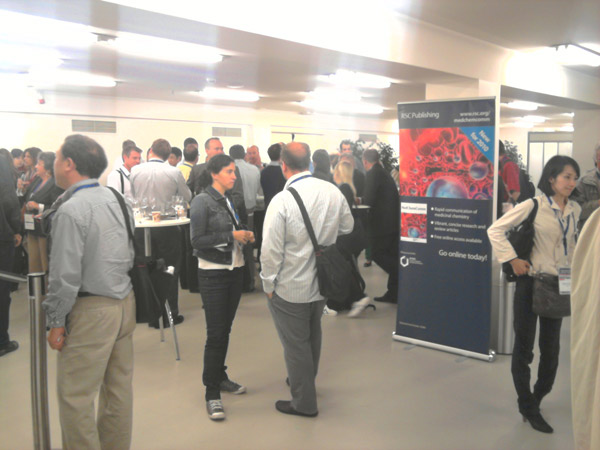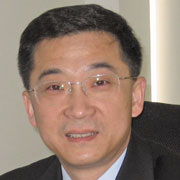Congratulations go to Dr Oliver Schwardt from the University of Basel, Switzerland, who won the MedChemComm poster prize at the recent EFMC-ISMC meeting in Brussels, Belgium. Dr Schwardt wins an RSC book and a year’s subscription to the journal.
Archive for the ‘News’ Category
Interview with Mark Bunnage: Medically speaking
Mark Bunnage talks to Leanne Marle about pharmaceuticals, chemologics and economics
 Mark Bunnage is executive director of worldwide medicinal chemistry at Pfizer in Sandwich, UK. His areas of responsibility include chemistry leadership for regenerative medicine. He is also a member of the Executive Committee of the European Federation for Medicinal Chemistry (EFMC) and an editorial board member for MedChemComm.
Mark Bunnage is executive director of worldwide medicinal chemistry at Pfizer in Sandwich, UK. His areas of responsibility include chemistry leadership for regenerative medicine. He is also a member of the Executive Committee of the European Federation for Medicinal Chemistry (EFMC) and an editorial board member for MedChemComm.
What led you into a career in medicinal chemistry?
I did a doctorate in organic chemistry at the University of Oxford, UK, followed by a post doc in total synthesis in the US. I guess I wanted to apply my skills as an organic chemist to help come up with new medicines – it seemed a really exciting way to put my training and skills to good use. This attracted me to the pharmaceutical industry and to join Pfizer.
What do you find most exciting about medicinal chemistry?
It feels a great privilege to be able to design and synthesise molecules that have never existed before. It is a genuine invention and very exciting to discover new molecules that can modulate human biology to potentially treat disease. This is a great way to apply chemistry and one of the best things about my job is that every day I’m learning new science. The field of medicinal chemistry is evolving quite significantly – so it’s a constant learning environment which is great fun. But the ultimate success is new medicines which can help people so it’s motivating from both the science and the application.
What projects are you working on at the moment?
One of the things we’re working on at the moment is regenerative medicine and the potential of stem cells as therapies. There’s a great opportunity for chemistry to influence this area of research by identifying small molecules that can modulate how stem cells behave. This could be to help generate viable cell therapy products or to find small molecule oral drugs that can influence stem cells to become new cell types and cause regeneration. It’s a cutting edge area in which chemistry is playing an important role.
One project the regenerative medicine group is working on is the treatment of blindness caused by age related degeneration of the cells in the eye. Basically if you could get a cell therapy to replace the retinal pigmented epithelial cells you could potentially restore sight.
What are the current challenges facing drug discovery?
Everyone recognises that the pharmaceutical industry has significant productivity challenges in terms of the number of new drug approvals each year relative to the R&D investment. One of the big reasons that we’ve not been as successful as we might is that we don’t always select the right target, so you can put a lot of investment in and take a quality molecule all the way to a Phase II clinical study but it doesn’t work. As an industry we’ve got to get much better at selecting molecular targets that can really influence disease. We really need to embrace chemical biology because the tools of chemical biology can help make the link between target and disease, and there are some cracking breakthroughs in this area of science that can now be applied in that sense.
This is why we’ve established a dedicated chemical biology group at Pfizer in Sandwich to really apply chemical biology with that aim. Selecting the target to work on is probably the most important decision we make and chemical biology can help with that. In addition, we are also applying the synthetic approaches of chemical biology to generate novel ‘chemologic’ therapeutics that are at the interface between small molecules and large.
What achievement are you most proud of?
One project that I’ve been involved in and that I’m excited about is a new treatment for respiratory disease that is in Phase II trials and is looking promising. There is still a major medical need to treat diseases such as asthma and chronic obstructive pulmonary disease and we’ve hopefully got quite an interesting inhaled product that will make a good addition to treatment options for patients.
You’re on the Editorial Board for the new RSC Journal MedChemComm, how did you get involved?
I’m also involved with the EFMC and the RSC approached us when they were thinking about a medicinal chemistry journal, so we partnered with the RSC to bring forward MedChemComm. We recognised it as a real opportunity for a quality new journal in the field of medicinal chemistry, and particularly one that perhaps helps to drive the scientific agenda within our discipline by covering traditional medicinal chemistry but also going beyond this to illustrate some of the ways that medicinal chemistry is evolving. I was very excited about the opportunity and that’s why I agreed to join the Editorial Board.
As a child, what did you want to be when you grew up?
Well sadly, what I wanted to be when I was a teenager was an economist, which I now look back in horror at the thought of this! But thankfully I saw the light when I studied A-Level Chemistry and saw that there was much more fun to be had in chemistry than in economics. Especially with recent events I’m really glad I didn’t end up in economics!
Download his first (but not last) MedChemComm paper
Small molecule modulation of stem cells in regenerative medicine: recent applications and future direction
Timothy E. Allsopp, Mark E. Bunnage and Paul V. Fish, Med. Chem. Commun., 2010, 1, 16
DOI: 10.1039/c0md00055h
See here the original interview
MedChemComm at the 21st EFMC-ISMC Symposium
MedChemComm was at the 21st International Symposium on Medicinal Chemistry in Brussels last week. The meeting, organised by the journal’s official partner the European Federation for Medicinal Chemistry, was a great success, especially the MedChemComm reception on the Tuesday afternoon. We’d like to thank everyone who attended the reception and hope that you had a great time.
RSC Spinks Symposium: Novel Therapeutics and Diagnostics in Alzheimer’s Disease
September 27th 2010 at the Chemistry Centre, Burlington House, London UK
Join in this discussion of the critical issues that underpin the future of both diagnostics and therapeutics for the treatment of Alzheimer’s Disease.
MedChemComm UK-China Symposium
We are delighted to announce the MedChemComm UK-China Symposium, which will take place on Monday 22nd November 2010 at The Chemistry Centre, London, UK.
This 1-day symposium will feature invited lectures by researchers working in academia and industry in the UK and China. Researchers and students with an interest in medicinal chemistry are welcome to attend. Speaking at the symposium will be:
Dr Jason Wong
Roche R&D Centre, China
Professor Chris Abell
University of Cambridge, UK
Dr Richard M Soll
WuXi AppTec, China
Dr Mark Bunnage
Pfizer, UK
Professor Fa-Jun Nan
Shanghai Institute of Materia Medica, CAS, China
Professor Paul Wyatt
University of Dundee, UK
Professor Zhenjun Yang
Peking University, China
More details, including details of how to register your attendance, are available on the symposium website at http://www.rsc.org/MCCSymp2010.
Student bursaries, provided by the RSC’s Organic Division and Biological & Medicinal Chemistry Sector are available.
Interview: Discovering drugs in China
Ming-Qiang Zhang talks about affordable medicines, nano vacuum cleaners and the new RSC journal MedChemComm. Interview by Holly Sheahan in Brussels.
One of the reasons why there are so many hepatitis B patients is because a full course of treatment is very expensive. But as the disease is so prevalent, employers ask for a medical check before hiring someone. So people buy just enough drugs so that they pass the medical check, but then stop taking them because they cannot afford to keep up the treatment. This has lead to the spread of a lot of drug-resistant strains of the disease. Not many companies are doing much research into hepatitis B drugs, especially in the west, so I think it’s important to do the research in China where a lot of the patients are and it is very important to make sure the drugs are affordable for everyone.
What research achievement are you most proud of?
The thing I am most proud of as a medicinal chemist is a project where we discovered an agent, called sugammadex, that would help the recovery of muscle function after surgery. Very often anesthetists give muscle relaxants to prepare patients for surgery, but after surgery you want the muscle function of the patients to return. Partly because many surgical procedures are done in one day without keeping the patient in. So it is important that the patient can leave and get on with their recovery. But also because the relaxant affects not only skeletal muscle but also muscles in the lungs and heart.
Before sugammadex, all the drugs used in clinics to recover muscle function were inhibitors of the enzyme acetylcholinesterase. The inhibition acts as a mechanism to increase the level of acetylcholine, which helps to recover muscle function but also leads to cardiovascular side effects. To protect the heart you also have to give the patients atropine, which in itself has other side effects.
The team that I was working with in Organon in the UK came up with the idea that instead of competing with the muscle relaxants at the receptors in order to increase acetylcholine levels and messing up the homeostasis balance, we could develop a ‘nano vacuum cleaner’ that will go into the system and suck up the drug once it has done its job and remove it from the body. That was a completely new concept and the chemistry was very difficult but we managed it using a class of cyclic sugars. Now the drug is marketed in Europe and is being used to help people.
I think the same principle could be used for a lot of different medical problems. Many medical cases in clinical practice are due to the side effects caused by overdosing, so a nano vacuum cleaner for all medicines would allow doctors to control their effect and control the drug more closely.
You recently moved to Shanghai from the UK to work for Roche R&D Centre. Tell me about your current role.
My current role is as the chief technology officer and vice president of external research, so it is a research role. We want to find technology that is useful in our drug discovery efforts. This might be in an academic institute or in a small company so we can either collaborate or license them. Our effort is focused on bringing together a diversity of research approaches to a project, but also trying to do drug discovery more quickly by leveraging external resources.
What is the secret to having a successful research group?
I would say team work, and what I think of as the 4 C’s. These are having a common goal, commitment, creativity and communication.
You are on the MedChemComm board, a new journal from the RSC, are you excited about this?
Although medicinal chemistry is a UK strength and pharmaceutical R&D is one of the greatest assets the UK has, it isn’t common to have a dedicated medicinal chemistry course in UK universities. So I think the creation of MedChemComm is a very good idea. There are lots of medicinal chemists out there, with many in industry and pharmacy departments and it is great to give these chemists somewhere to publish.
You went to the University of Antwerp, based here in Belgium, is it nice to be back?
It is very interesting to come back! I was based here for three and a half years doing my PhD in medicinal chemistry. For me, coming to Europe was very exciting, I got a scholarship from the Chinese Ministry of Education, and I very much enjoyed living here.
If you weren’t a scientist what would you be?
After graduation of high school, I worked as a farmer for a while in the countryside, and the teacher in the village I was staying in could not work for some reason. As I was well educated, I was asked to step in. I was only 17 but I really enjoyed it, so perhaps I would have been a teacher.
MedChemComm – call for papers
MedChemComm issue 1 is now published. Why not submit your own high quality work today?
 |
MedChemComm is an international journal publishing high-impact research in medicinal chemistry, including new studies related to biologically-active chemical or biochemical entities that can act as pharmacological agents with therapeutic potential or relevance.Articles published in MedChemComm benefit from wide exposure. Free access to all content published during 2010 and 2011 will give maximum visibility to your work. In addition, the journal will maintain a strong conference presence, and receive extensive promotion to the wider scientific press.RSC journals are well known for their high scientific quality, impact, and exceptionally fast publication times. Papers will be published online in a citable form as soon as they are ready. The journal will be fully indexed in ISI and other leading databases. |
Authors publishing their work in MedChemComm also benefit from:
* Rigorous peer-review by experts in the field
* Rapid times to publication
* Simple and effective e-submissions
* Free use of colour online, and in print where it enhances the article
* No page charges
* Free electronic reprints (pdf) of athors’ own paper(s)
* Electronic supplementary information
* Free e-mail alerting and RSS news feeds service
* Additional publishing options via RSC Open Science
For more information, visit the MedChemComm website or contact me by email.
Issue 1 of MedChemComm Published
RSC Publishing today announced the online publication of the first issue of MedChemComm, a new high-impact, peer-reviewed journal for the rapid publication of research in medicinal chemistry.
Free for all to read online, this inaugural issue contains two Reviews and ten Concise Articles, including:
| Small molecule modulation of stem cells in regenerative medicine: recent applications and future direction Timothy E. Allsopp, Mark E. Bunnage and Paul V. Fish Effect of particle shape on phagocytosis of CdTe quantum dot-cystine composites Chemical space as a source for new drugs |
 |
In addition, you can read a welcome to the first issue from co-Editors-in-Chief Greg Verdine and Tony Wood, an introduction to the journal’s partnership with the EFMC written by the EFMC president Gerhard Ecker, and profiles of our Editorial Board members.
Authors from around the globe have submitted work of the highest quality, knowing that they can rely on RSC Publishing for overseeing a rigorous peer-review process, efficient manuscript handling and rapid publication.
In addition, they can be confident that the free online access to the latest issue of the journal gives their work the best possible visibility in the community.
Make sure you keep up-to-date with the latest issue by signing up for the MedChemComm e-alert and newsletter. And if you want to be part of this exciting new journal, submit your work today.
MedChemComm Issue 1 – View the contents of the first issue
Follow MedChemComm with Twitter
MedChemComm has joined the Twitter community! Keep up to date with the latest Hot Articles and news by becoming a follower of our Twitter feed.
Twitter is a social networking tool that allows for real-time updates of short messages. If you tweet, follow the MedChemComm feed to keep up to date with the latest Hot Articles, published issues, themed issues and latest news.

Free online access to MedChemComm
All online content from the new RSC Publishing journal MedChemComm is available for FREE during 2010 and 2011.
Access, which will be managed by institution and IP address, will be provided following a simple registration process. In addition, the current issue of the journal will be freely available to everyone online, without the need for any registration.
The new approach is in response to feedback from scientists, librarians and other information specialists. It is envisaged that the free access will help both scientists and librarians/information specialists to fully evaluate the new journal, before they consider taking out a license or a subscription in 2012.
To register for free access at your institution or to sign up for our free E-alert service, please complete the online form.












